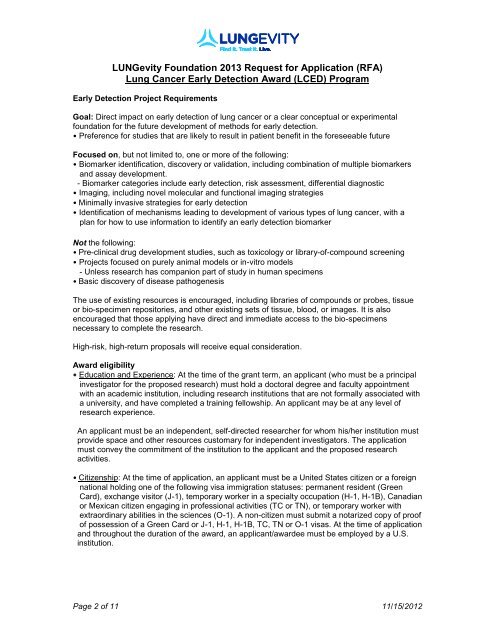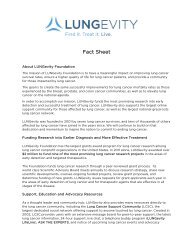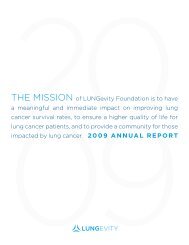RFA Lung Cancer Early Detection Award - LUNGevity Foundation
RFA Lung Cancer Early Detection Award - LUNGevity Foundation
RFA Lung Cancer Early Detection Award - LUNGevity Foundation
Create successful ePaper yourself
Turn your PDF publications into a flip-book with our unique Google optimized e-Paper software.
<strong>LUNGevity</strong> <strong>Foundation</strong> 2013 Request for Application (<strong>RFA</strong>)<br />
<strong>Lung</strong> <strong>Cancer</strong> <strong>Early</strong> <strong>Detection</strong> <strong>Award</strong> (LCED) Program<br />
<strong>Early</strong> <strong>Detection</strong> Project Requirements<br />
Goal: Direct impact on early detection of lung cancer or a clear conceptual or experimental<br />
foundation for the future development of methods for early detection.<br />
• Preference for studies that are likely to result in patient benefit in the foreseeable future<br />
Focused on, but not limited to, one or more of the following:<br />
• Biomarker identification, discovery or validation, including combination of multiple biomarkers<br />
and assay development.<br />
- Biomarker categories include early detection, risk assessment, differential diagnostic<br />
• Imaging, including novel molecular and functional imaging strategies<br />
• Minimally invasive strategies for early detection<br />
• Identification of mechanisms leading to development of various types of lung cancer, with a<br />
plan for how to use information to identify an early detection biomarker<br />
Not the following:<br />
• Pre-clinical drug development studies, such as toxicology or library-of-compound screening<br />
• Projects focused on purely animal models or in-vitro models<br />
- Unless research has companion part of study in human specimens<br />
• Basic discovery of disease pathogenesis<br />
The use of existing resources is encouraged, including libraries of compounds or probes, tissue<br />
or bio-specimen repositories, and other existing sets of tissue, blood, or images. It is also<br />
encouraged that those applying have direct and immediate access to the bio-specimens<br />
necessary to complete the research.<br />
High-risk, high-return proposals will receive equal consideration.<br />
<strong>Award</strong> eligibility<br />
• Education and Experience: At the time of the grant term, an applicant (who must be a principal<br />
investigator for the proposed research) must hold a doctoral degree and faculty appointment<br />
with an academic institution, including research institutions that are not formally associated with<br />
a university, and have completed a training fellowship. An applicant may be at any level of<br />
research experience.<br />
An applicant must be an independent, self-directed researcher for whom his/her institution must<br />
provide space and other resources customary for independent investigators. The application<br />
must convey the commitment of the institution to the applicant and the proposed research<br />
activities.<br />
• Citizenship: At the time of application, an applicant must be a United States citizen or a foreign<br />
national holding one of the following visa immigration statuses: permanent resident (Green<br />
Card), exchange visitor (J-1), temporary worker in a specialty occupation (H-1, H-1B), Canadian<br />
or Mexican citizen engaging in professional activities (TC or TN), or temporary worker with<br />
extraordinary abilities in the sciences (O-1). A non-citizen must submit a notarized copy of proof<br />
of possession of a Green Card or J-1, H-1, H-1B, TC, TN or O-1 visas. At the time of application<br />
and throughout the duration of the award, an applicant/awardee must be employed by a U.S.<br />
institution.<br />
Page 2 of 11 11/15/2012








